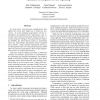Free Online Productivity Tools
i2Speak
i2Symbol
i2OCR
iTex2Img
iWeb2Print
iWeb2Shot
i2Type
iPdf2Split
iPdf2Merge
i2Bopomofo
i2Arabic
i2Style
i2Image
i2PDF
iLatex2Rtf
Sci2ools
102
Voted
IEEEPACT
2007
IEEE
2007
IEEE
Speculative Decoupled Software Pipelining
In recent years, microprocessor manufacturers have shifted their focus from single-core to multi-core processors. To avoid burdening programmers with the responsibility of parallelizing their applications, some researchers have advocated automatic thread extraction. A recently proposed technique, Decoupled Software Pipelining (DSWP), has demonstrated promise by partitioning loops into long-running, fine-grained threads organized into a pipeline. Using a pipeline organization and execution decoupled by inter-core communication queues, DSWP offers increased execution efficiency that is largely independent of inter-core communication latency. This paper proposes adding speculation to DSWP and evaluates an automatic approach for its implementation. By speculating past infrequent dependences, the benefit of DSWP is increased by making it applicable to more loops, facilitating better balanced threads, and enabling parallelized loops to be run on more cores. Unlike prior speculative threa...
Automatic Thread Extraction | Hardware | IEEEPACT 2007 | Inter-core Communication | Prior Speculative Threading |
Related Content
| Added | 03 Jun 2010 |
| Updated | 03 Jun 2010 |
| Type | Conference |
| Year | 2007 |
| Where | IEEEPACT |
| Authors | Neil Vachharajani, Ram Rangan, Easwaran Raman, Matthew J. Bridges, Guilherme Ottoni, David I. August |
Comments (0)

